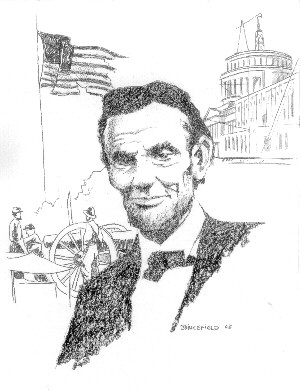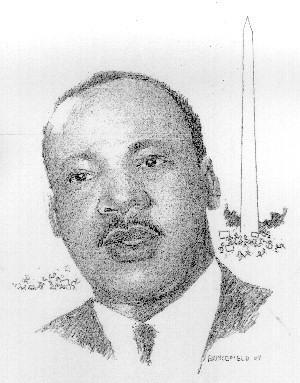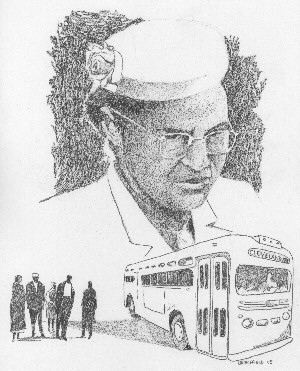
Abraham
Lincoln |
The
Structure of A Study of Heroes
A
STUDY OF HEROES is a classroom-tested program that readily
fits into existing curricula. The program includes an
Instructor's Guide; 22 Hero Profile Units (approximately
60 pages each) containing an array of student activities
and worksheets that integrate skill areas such as history,
reading, creative writing, political/social topics, debate,
conflict resolution, the arts, research, character education
and service learning; additionally, there are eight Companion
Units.
The
instructional materials are developed for three readability
levels and all three levels of reading are included in
each unit. These materials can be easily adapted for use
with varying skill levels or to reinforce content skills
or concepts. Educators can elect to use any or all of
the HEROES units, in any order.
Rather
than the inflexible, tightly sequenced, and prescriptive
design of many curricula, the HEROES Program units provide
teachers from Kindergarten-12 and Adults, community organizations,
and scouting/youth groups with an abundance of easy to
use, unique resources. The program materials are content-rich
and draw heavily upon both the cognitive, affective, inquiry
and psycho-motor domains. Resources such as A STUDY OF
HEROES encourage the instructor to become a creative instructional
decision maker. The instructor "owns" the program and
determines when and how HEROES is employed; we know that
the instructors are most familiar with their own academic
priorities and time constraints. This program is a time
saver, is enjoyable for the instructor to use, and is
highly engaging for students of all ages. Support for
the program's format came from general education, bilingual,
remedial, and "gifted and talented" teachers, as well
as from school specialists in the pilot schools.
The
more than 2000 pages of instructional resources are unbound
for flexibility and ease of use. All materials are copyrighted
to be reproduced for use within the building for which
HEROES was purchased. The entire resource collection
itself is packaged in binders to facilitate both storage
and use.

Martin
Luther King, Jr. |
Focus
of the Program
All
elements of the reproducible program reinforce basic skills,
encourage family involvement and intergenerational discussion
about the character of heroes. It provides motivational
and creative activities for students, stimulates social
problem-solving strategies, encourages "invention," brings
the community into the classroom and vice versa, permits
flexible instruction, and includes many ways to say "thank
you" to all who participate in the HEROES Program. Character
education, nonviolent conflict resolution strategies,
and service learning are at the heart of this program.
Variety
in Interdisciplinary Instructional Formats
The
program resources incorporate many subject areas, including
language arts, history, fine arts, social studies, performing
arts, journalism, geography, reading, poetry, storytelling,
oration, creative writing, and mathematics. Instructors
have the opportunity to use the resources in a variety
of instructional formats, including whole class instruction,
small groups, cooperative learning, independent study,
committee or club work, and community service.
Special
Projects and Events
An
array of special projects and events highlight the students'
work, included are activities, such as: a "Heroes Fair";
a "Heroes Quilt"; original songs and theatrical productions;
a "Heroes Garden"; community surveys; dioramas; social
commentary cartoons; interpretive dances; letter writing;
murals; a "Heroes Hall of Fame"; photo essays; debates;
role-plays; puppet shows; creative research and technological
projects.
A
Complement to Existing Curricular Requirements
This
collection of instructional resources bolster and complement
existing curricular requirements, particularly those in
character education and conflict resolution currently
being enacted in many states. To complement most curricular
guidelines and to address the standards, the program provides
the following emphases:
1.
The hero within yourself; 2. The hero in the school, community,
culture, and world; 3. Differences between the "hero"
and the "celebrity"; 4. Biographical sketches of real
heroes; 5. Research methodologies, technologies, and ethics.

Rosa
Parks |
Empowerment
of Individuals
A
STUDY OF HEROES goes far beyond simply reading historical
biographies. It is not just about the past. This program
emphasizes the present and the future. It enriches people's
lives. It requires the appreciation of historical context.
But, perhaps most important, it inspires students to discover
their inner strengths, compassion for others, a sense
of right and wrong, strategies for resisting negative
peer pressure, a celebration of diversity, a tolerance
for diversity, and the realization that every individual
has the power to make a positive difference in the lives
of others.
A
Multicultural Focus
Among
the selected heroes are men and women from different historical
periods and many regions of the world, people of various
ages, different races, diverse religions, and numerous
ethnicities and cultures. These people did not plan to
become heroes, but they found themselves in positions
in which often serendipitous circumstances offered them
the opportunity to act heroically. Some gave their lives
for the benefit of others; several performed simple acts
of kindness that affected others in a positive way. All
provide positive role models for students everywhere.